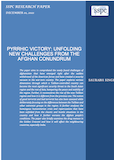PYRRHIC VICTORY: UNFOLDING NEW CHALLENGES FROM THE AFGHAN CONUNDRUM

The paper aims to comprehend the newly found challenges of Afghanistan that have emerged right after the sudden withdrawal of the American forces and have created a security vacuum in the war-torn country. The paper explores various dimensions through which a Taliban-controlled country can become the most significant security threat to the South Asian region and the rest of Asia, hampering the peace and stability of the region. Further, it reconnoitres the rise of the new Taliban regime and how it is different from the previous one.

